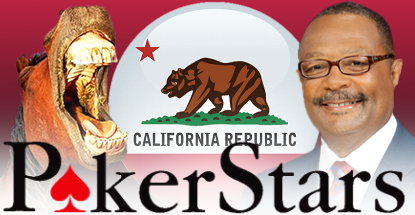 UPDATED WITH PECHANGA AND MORONGO COMMENTS AT BOTTOM
UPDATED WITH PECHANGA AND MORONGO COMMENTS AT BOTTOM
A new online poker bill has arrived in California courtesy of Assemblyman Reggie Jones-Sawyer (pictured right). Titled the Internet Poker Consumer Protection Act of 2015 (read it here), the bill differs from Mike Gatto’s AB 9 legislation by allowing state racetracks to join Indian tribes and card clubs in the state’s online poker industry.
More importantly, the AB 167 bill contains no specific ‘bad actor’ clause, at least, not the boilerplate prohibition of any company that accepted wagers from state residents after Dec. 31, 2006. Instead, it deems companies/people to be ineligible if they have “contemptuously defied a legislative investigative body” of a US state, the federal government or a foreign jurisdiction “when that body is engaged in the investigation of crimes relating to poker, official corruption related to poker activities or criminal profiteering activity or organized crime.”
Ditto for anyone convicted ‘in a court of competent jurisdiction of a felony for either having accepted a bet over the internet in violation of United States of California law, or having aided or abetted that unlawful activity.”
The bill also doesn’t contain any mention of the dreaded phrase “covered assets,” clauses that block the use of software, brands, databases and other tools of the trade if said tools had anything to do with any felonious activity. As is, the bill offers the least possible resistance to Amaya Gaming and its new PokerStars property of any California online poker bill to date.
Not so lucky is any tribe that operates a gaming site that accepts wagers from players not physically present on Indian lands, which would be ruled ineligible. This clause is directed squarely at the Iipay Nation of Santa Ysabel and their Desert Rose Bingo site, which utilizes virtual private network technology to interact with gamblers outside its tribal boundaries.
FELONIES FOR PLAYERS
Alarmingly, the bill warns that “any violation” of the Act would be punishable as a felony. The language states that “the offer or play of any gambling game provided over the Internet that is not an authorized Internet poker game permitted by the state” would be prohibited. For Californians, merely patronizing an unauthorized site is a felony, “punishable by imprisonment pursuant to subdivision (h) of Section 1170 of the Penal Code.”
The bill would establish an Unlawful Gambling Enforcement Fund, into which would flow an unspecified percentage of revenue from civil penalties to finance future enforcement proceedings.
NITTY GRITTY
The bill defines eligible operators as any federally recognized California Indian tribe that has operated a gaming facility for the past five years, plus licensed card rooms and any “California-owned and operated horseracing association” that is based in the state. Any combo of the above three categories is also eligible to team up on a joint venture.
Licenses would be valid for four-year terms with automatic four-year renewals, although all initial licenses will be deemed ‘temporary’ and valid for only two years. All licenses will take effect on the same date, one year after regulations are written. The regulations need to be finished within 270 days of the bill’s passage.
Licensees would be required to make an upfront deposit of $10m, which would be credited against quarterly payments of 8.5% tax on gross gaming revenue. Additional regulatory fees of undetermined value would also be imposed.
While the bill refers to intrastate online poker, it doesn’t contain the explicitly anti-interstate language of previous bills, offering hope that other states may one day be allowed to tap into California’s vast player pool.
The bill is deemed an urgency statute, requiring 2/3 approval in both legislative chambers. The bill has future dates with both the appropriation and fiscal committees.
NOW WHAT?
In a statement accompanying the bill, Jones-Sawyer said the bill represented “a new starting point” following “a very thoughtful and collaborative discussion process that included substantial input from both the state’s Department of Justice and Gambling Control Commission.” We eagerly await the verdicts of the two principal antagonists in this debate: the tribes that support PokerStars’ participation and those vehemently opposed to the idea.
UPDATE: Pechanga Tribal Chairman Mark Macarro issued a statement saying there was “much for tribes to dislike about this bill.” Macarro said the bill “disregards important principles from a broad coalition of respected tribes and card rooms that help prevent corporations and entities that previously violated federal law from profiting from tainted software, brands, and databases derived from illegal activity.
“Tribes have been steadfast in the principle that online poker be consistent with California’s longstanding public policy of limited gaming, and that means keeping it to just tribes and card rooms. California voters have always had the final say on gaming expansion and they have already rejected expansion of gaming for horse racing.”
Robert Martin, who represents the pro-PokerStars Morongo Band of Mission Indians, told Pechanga.net’s Dave Palermo he was encouraged by the bill and said the softening of the ‘bad actor’ language “goes a long way” toward garnering the approval of his coalition.






